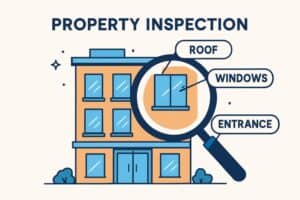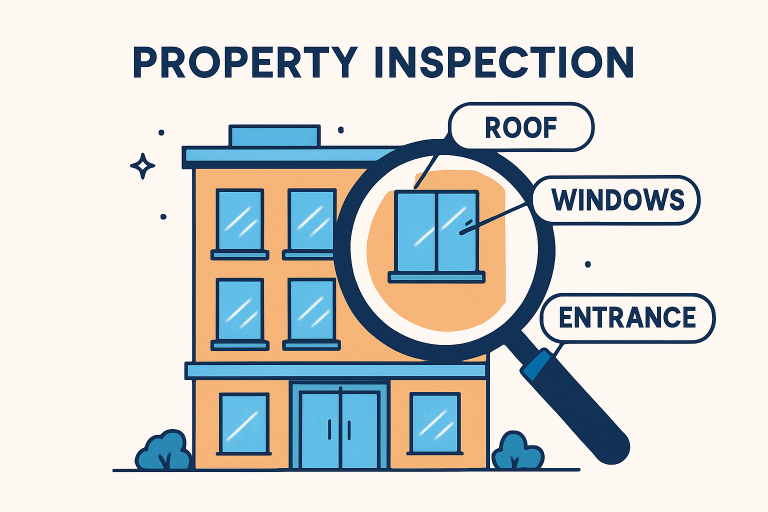Key Takeaways
- Commercial property inspections are essential for uncovering physical and mechanical issues that impact value and safety.
- Inspections support due diligence, risk mitigation, and negotiation processes during commercial sales.
- A thorough inspection enhances marketability and ensures legal compliance, protecting buyers and sellers alike.
Table of Contents
- Understanding Commercial Property Inspections
- Key Components of a Commercial Property Inspection
- Benefits of Conducting Property Inspections
- Legal and Regulatory Compliance
- Enhancing Property Value and Marketability
- Role in Due Diligence
- Common Issues Uncovered During Inspections
- Conclusion

Understanding Commercial Property Inspections
Commercial property inspections are in-depth analyses of a building’s structure, systems, and compliance. The process involves a detailed examination that distinguishes it from a typical residential inspection, bringing higher standards and more complex regulatory considerations. For business owners or real estate investors, understanding the role of inspections is fundamental to ensuring a property is both a sound investment and a safe environment for occupants.
Objective information about the property’s condition is a powerful tool for stakeholders on all sides of the transaction when selling or acquiring commercial real estate. Fast property buyers in Arlington often prioritize comprehensive inspections to secure quick, informed investments. This allows them to identify risks, better estimate repair costs, and proceed confidently in deals requiring speed and accuracy.
Inspections minimize surprises after closing and support smoother negotiation processes between buyers and sellers. Proactively conducting inspections can present a transparent, well-maintained property for sellers, expediting transactions and leveraging trustworthiness.

Key Components of a Commercial Property Inspection
- Structural Integrity: Inspectors evaluate the building’s foundation, load-bearing walls, roof, and other vital supports for signs of shifting, water intrusion, or deterioration.
- Mechanical Systems: HVAC systems, electrical panels and wiring, plumbing lines, and more are tested for safety, compliance, and efficiency.
- Safety Compliance: Properties are reviewed for fire escape routes, sprinkler systems, emergency lighting, and accessibility features to meet local and national codes.
Benefits of Conducting Property Inspections
- Risk Mitigation: Inspections catch early signs of problems such as foundation cracks, aging roofs, or inadequate electrical capacity. Addressing these preemptively can help avoid expensive emergency repairs or catastrophic failures after the sale.
- Financial Planning: A detailed report gives investors clarity about immediate and future maintenance needs, supporting more accurate budgeting and capital allocation.
- Negotiation Leverage: With objective data, parties can negotiate price adjustments or request that sellers make specific repairs before closing, creating win-win outcomes for all involved.
Legal and Regulatory Compliance
Local municipal codes and federal standards for commercial buildings are strict and ever-evolving. Inspections are crucial for uncovering violations related to fire safety upgrades, ADA requirements, zoning ordinances, and environmental standards. Proactive compliance ensures occupant safety and shields owners from lawsuits, regulatory fines, or delayed deals due to non-compliance issues.
Enhancing Property Value and Marketability
A well-inspected property signals to buyers and tenants that it’s a sound, low-risk investment. Clean inspection reports allow buildings to command higher sale prices and leasing rates while reducing the risk of negotiations stalling over undisclosed defects. This transparency distinguishes a property from others still carrying unknown or unresolved issues in highly competitive markets. For sellers seeking a fast close, cash deal in Fort Worth, presenting a fully inspected, move-in-ready space can accelerate the transaction and attract serious, qualified buyers.
Role in Due Diligence
Rigorous due diligence is standard in commercial real estate transactions. Inspections equip investors with the factual insights to make strategic decisions, align offers to the building’s true value, and protect against unexpected post-sale costs. They also offer institutional buyers a detailed baseline for ongoing operational planning and risk management post-acquisition.
Common Issues Uncovered During Inspections
- Cracking or settling in foundations and exterior walls can threaten long-term stability.
- Roof leaks or worn-out membranes potentially leading to water damage and mold.
- HVAC systems operating near the end of their life cycle or failing to heat/cool efficiently.
- Electrical panels or wiring configurations that fall short of present-day safety codes.
- Plumbing leaks, corroded pipes, or insufficient water pressure impact usability and costs.
Conclusion
Property inspections offer commercial buyers, sellers, and investors the transparency, confidence, and actionable intelligence needed to execute successful transactions. In today’s real estate market, a comprehensive inspection is not just a helpful precaution—it’s an indispensable asset in preserving building value, ensuring compliance, and supporting sound financial decisions. For anyone considering a move in the commercial sector, prioritizing a thorough inspection is the best path to minimizing risk and maximizing opportunity.








